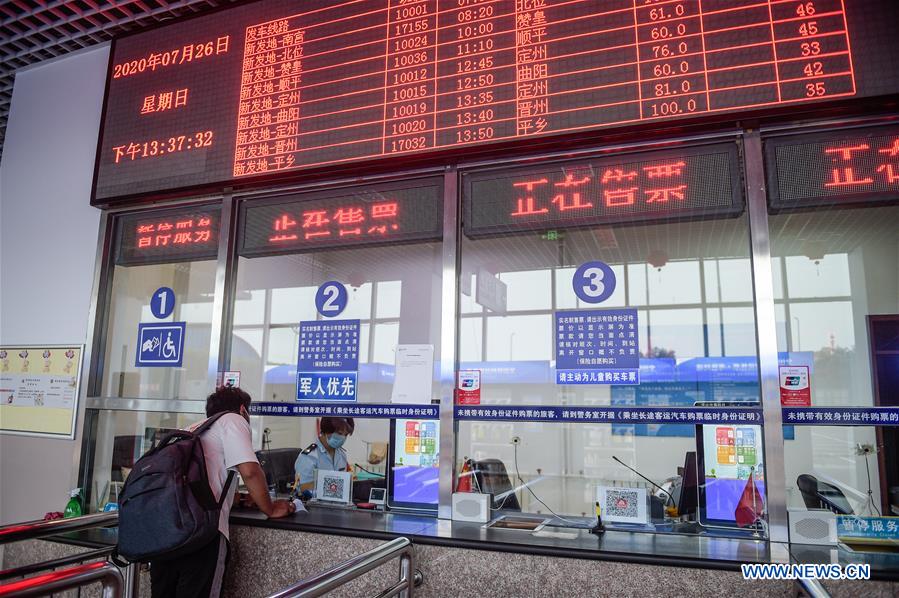China fights COVID-19 in people-first approach

A passenger buys ticket at the reopened Xinfadi intercity bus terminal in Beijing, capital of China, July 26, 2020. Long-distance bus travel services have resumed Sunday at Beijing's Xinfadi intercity bus terminal as COVID-19 situation comes under control. [Photo/Xinhua]
BEIJING -- Since the COVID-19 outbreak, China has waged a whole-of-nation "people's war" against the virus.
Under the strong leadership of the Communist Party of China Central Committee with Comrade Xi Jinping at the core, the country has put people's lives and health first, fully demonstrating its people-centered philosophy.
ALL-OUT WAR
The COVID-19 epidemic is the fastest spreading, most extensive and most challenging public health emergency the country has encountered since the founding of the People's Republic of China.
Closing outbound traffic from Wuhan, the virus-ravaged city in Central China's Hubei province, on Jan 23 was a crucial step to stem the spread of the virus.
The "lockdown" of Wuhan, with a population of more than 10 million, along with emergency response measures elsewhere helped reduce about 700,000 infections in China, according to the analysis of 15 leading global research institutes.
The dispatch of medical supplies and medical teams to Hubei soon began.
A total of 346 medical teams and 42,600 medical workers were sent to Hubei, including the teams led by China's top 10 academicians and nearly one-tenth of the country's best intensive care doctors and nurses.
The country's best medical resources were pooled together to save lives. Medical bills for hospitalized COVID-19 patients were all covered by medical insurance and fiscal funds.
"The collectivist concept of human rights, rooted in traditional Chinese culture, is an important reason for the effectiveness of the epidemic prevention and control measures," said Liu Huawen, executive director of the institute of human rights studies of the Chinese Academy of Social Sciences.
Fu Zitang, president of Southwest University of Political Science and Law, said China has put life above all else in the fight and taken extraordinary measures, securing major strategic achievements in containing COVID-19.
"The all-out war against COVID-19 safeguards human rights," said Fu, also vice president of the China Society for Human Rights Studies.
SECURING PEOPLE'S RIGHT TO DEVELOPMENT
While containing the epidemic, China has taken steps to restore a sense of normalcy in everyday life as ensuring people's employment, livelihood and education are key to safeguarding their right to development.
Companies were relieved of social security contributions totaling over 340 billion yuan ($48.6 billion) between February and April. Subsidies of 46.5 billion yuan were given to 3.45 million companies to help them tide over difficulties and reduce layoffs.
China fights the virus as it fights poverty. Wiping out absolute poverty is an important aspect of promoting human rights.
China aims to lift all rural residents living below the current poverty line out of poverty in 2020. The anti-poverty fight is advancing with concrete progress across the country.
China is expected to reach the poverty reduction goal set by the United Nations in its 2030 Agenda for Sustainable Development a decade ahead of schedule.
On education, the government has pushed schools to offer online courses during the epidemic and offered help for students in need to ensure no one is left behind.
VARIOUS RIGHTS PROTECTED
During the COVID-19 fight, China has not neglected the rights of people with disabilities.
The National Health Commission has been helping the disabled get more information and better services.
Subsidies and supportive policies were issued to people with financial difficulties.
The people's right to oversight is guaranteed as the government has launched an online platform to collect people's complaints on problems they find in local epidemic control efforts.
Starting in late January, press conferences were regularly held by the State Council's joint prevention and control mechanism against COVID-19 to keep the people informed on issues such as patient treatment, the allocation of supplies, the resumption of work and production as well as the reopening of schools.
INTERNATIONAL COOPERATION ENHANCED
In June, the United Nations Human Rights Council again adopted a resolution China submitted on human rights cooperation.
The resolution calls for fostering a new type of international relations based on mutual respect, fairness, justice and mutually beneficial cooperation, as well as building a community with a shared future for mankind. All countries are urged to undertake genuine dialogue and cooperation in the field of human rights, and share valuable practices and experience in promoting and protecting human rights.
As the COVID-19 pandemic ravaged the world, more and more countries have come to recognize the importance of sticking together through thick and thin, as exemplified by what China has done.
China promptly reported information on COVID-19 to the World Health Organization and released the genome sequence at the earliest possible time, and carried out international cooperation among epidemic prevention and control experts in a timely manner.
China bought precious time for the rest of the world, living up to its status as a responsible major country.
More than 170 countries and over 40 international and regional organizations expressed sympathy and support for China.
Adhering to the vision of a community with a shared future for mankind and the spirit of international humanitarianism, China has fought shoulder to shoulder with the rest of the world.
By late May, China had shared its diagnosis, treatment, prevention and control solutions with over 180 countries and more than 10 international and regional organizations, sent medical teams to countries in need and provided emergency aid to nearly 150 countries and four international organizations.
China, as a responsible major country, will stay committed to safeguarding various rights of the people and continuously promoting the healthy development of the human rights cause.








